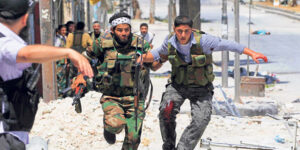
The army applied bigeminal launchers at the nearby Talet Qawqaba base and artillery unit at Mezze Military Airport, west of Daraya, to attack the town, where confrontation fighters were still holed up, activists in Damascus told
The Syrian government army beat the Damascus suburb of Daraya on Friday, killing at least twenty-one people on the 3rd day of a campaign to regain control of outlying areas of the capital, confrontation activists told.
“Heavy weapon is firing from Qasioun Mountain in regular bursts of heavy barrages. I wonder what is left of the town,” said one woman watching the shelling from Damascus.
At least hundred people, including fifty-nine civilians, died in violence across the nation, in accordance with the confrontation Syrian Observatory for Human Rights on Thursday. Some 200 were killed on Wednesday, bringing the three-day death toll to 321.
Daraya, a sprawled Sunni Muslim working-class area, is located among the old Ghouta farmlands surrounding Damascus, where guerrillas have been taking cover after attacking government troops.
Confrontation activists told the death toll in Daraya in the past 72 hours had arrived at at least 70, mostly civilians. A list of the names of the twenty-one killed on Friday included 2 children from the al-Khatib family.
The army applied multiple launchers at the nearby Talet Qawqaba base and artillery at Mezze Military Airport, west of Daraya, to attack the town, where confrontation fighters were still holed up, activists in Damascus told.
“There are lots of dead bodies trapped in demolished buildings and civilians are assaying to flee towards Damascus,” an confrontation activist in Daraya calling himself Abu Kinan told Reuters by phone.
A witness in Damascus told the army was also shelling Daraya from Republican Guards positions on Qasioun Mountain, on the northern edge of the capital. “In the last few minutes nine shells were fired on Daraya from Qasioun,” she told.
Fighting was also reported in a series of lower-middle-class Sunni suburbs which surround the capital, including Qatana, Sbeineh, Qadam, Assali and Hajar al-Asswad, they said.
Assad’s elite forces, made up mainly of members of his minority Alawite sect and increasingly used to keep control of Damascus, are based in hilltop compounds in the capital and surrounding areas.















